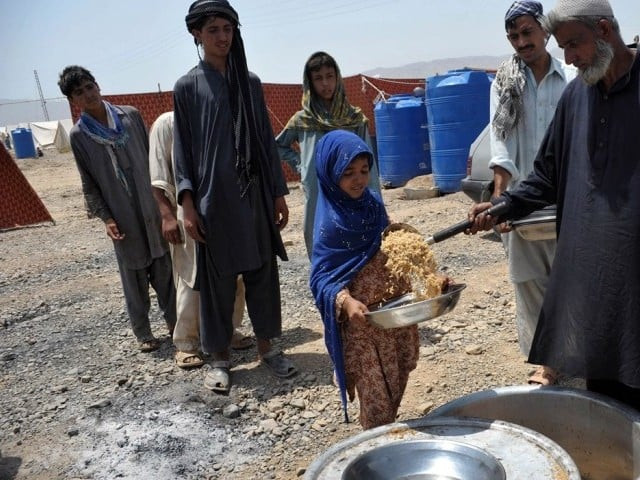Food Fortification Programme: Significant improvement in nutrient intake targeted
Programme aims to make fortified flour, cooking oil easily available

Programme aims to make fortified flour, cooking oil easily available.
PHOTO: AFP
The programme launch was held in Islamabad on Thursday. The UK’s Department for International Development, working with Mott MacDonald and Micronutrient Initiative, has launched the Food Fortification Programme to improve nutrition for of people in Pakistan, particularly women of childbearing age and children.
The programme will work closely with the Government of Pakistan, as well as communities and government at all levels, including the Ministry of National Health Services Regulations and Coordination, the National and Provincial Fortification Alliances, the Pakistan Flour Mills Association, Pakistan Vanaspati Manufacturers Association, and the Pakistan Standards and Quality Control Authority.
Pakistan has the third-highest number of children under five in the world suffering from malnutrition. The most recent national survey found that 44 per cent of under-fives in Pakistan suffer stunted growth, 62 per cent are anaemic, and 54 per cent have vitamin A deficiencies. In addition, one in five children in Pakistan have low birth weight, while 51 per cent of pregnant women have anaemia, 37 per cent have iron deficiency, and 46 per cent have vitamin A deficiency.

The programme will provide technical assistance to governments at federal, provincial, and district levels on technical standards, legislative and regulatory frameworks, as well as laboratory testing infrastructure. It will help millers with the financial costs of micro-feeder equipment and provide subsidies to mills towards the cost of premix as an incentive to produce high-quality fortified flour.
It will also provide training and technical support to millers. The programme will also help the public understand the benefits of fortified foods, so families can increase their demand for wheat fortified with iron and folic acid, and edible oils with vitamins A.
The programme’s aim is that within five years, over half of the population of Pakistan consumes fortified wheat flour, and over two-thirds use fortified edible oil and ghee. It will be working with over 1,000 wheat flour mills and 100 edible oil mills, explained Tausif Janjua from MI.
Speaking at the launch DFID Pakistan Head Joanna Reid regretted that “the level of malnutrition in Pakistan is a tragedy. Nearly half of all children under five in Pakistan are chronically malnourished”.
Malnutrition, she said, leaves children more vulnerable to disease, stunts their mental and physical development, and leads to lifelong learning and memory deficiencies, and poorer achievement at school. It damages families and communities, locks in poverty, and costs Pakistan around 2-3% of its GDP.
“Food fortification is a safe, cost-effective way of decreasing micronutrient deficiencies. That is why the British people, through UK Aid, are investing in the Food Fortification Programme. We believe that this programme will benefit millions in Pakistan” she maintained.
Micronutrient Initiative President and CEO Joel Spicer noted that this is a team approach that includes partners, all levels of government across multiple ministries, as well as the private sector. This project, and this group, recognises that improving nutrition is the key to developing human potential and to securing the future of Pakistan.”
The fortification of wheat flour with iron and folic acid and edible oil with vitamin A and D would help us reduce the hidden hunger from our population, said Minister for National Health Services Regulations and Coordination Saira Afzal Tarar.
The lack of iron, vitamins A and D and other minerals limit the body’s ability to fight disease. Of the approximately 500,000 Pakistani children who die every year before reaching their fifth birthday, half die due to malnutrition.
Published in The Express Tribune, September 9th, 2016.



















COMMENTS
Comments are moderated and generally will be posted if they are on-topic and not abusive.
For more information, please see our Comments FAQ